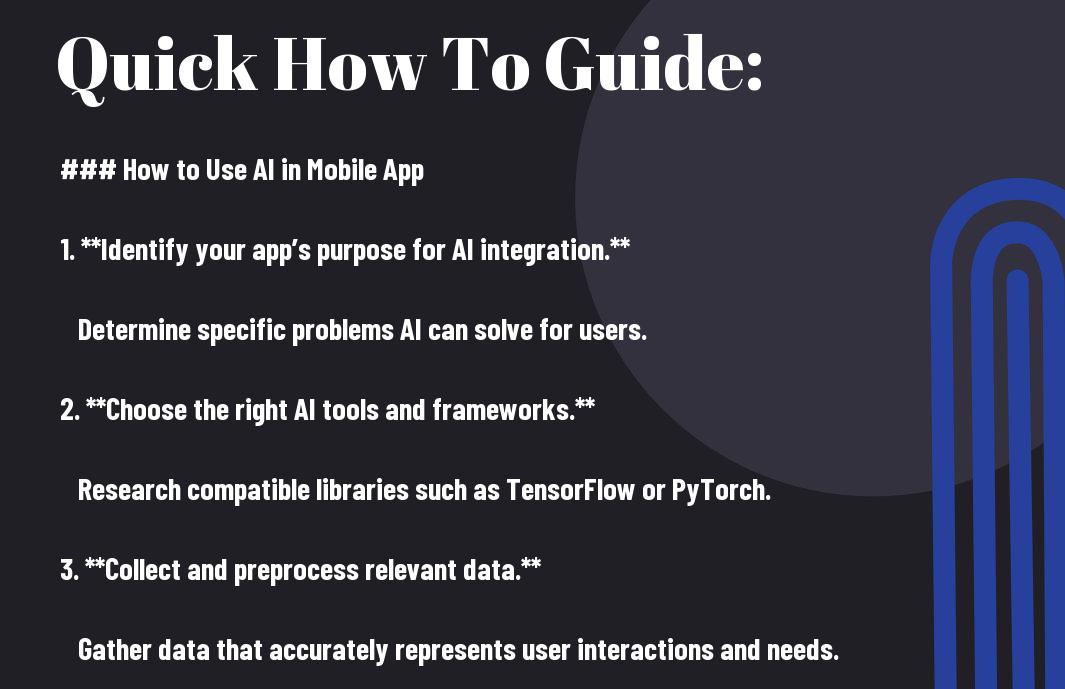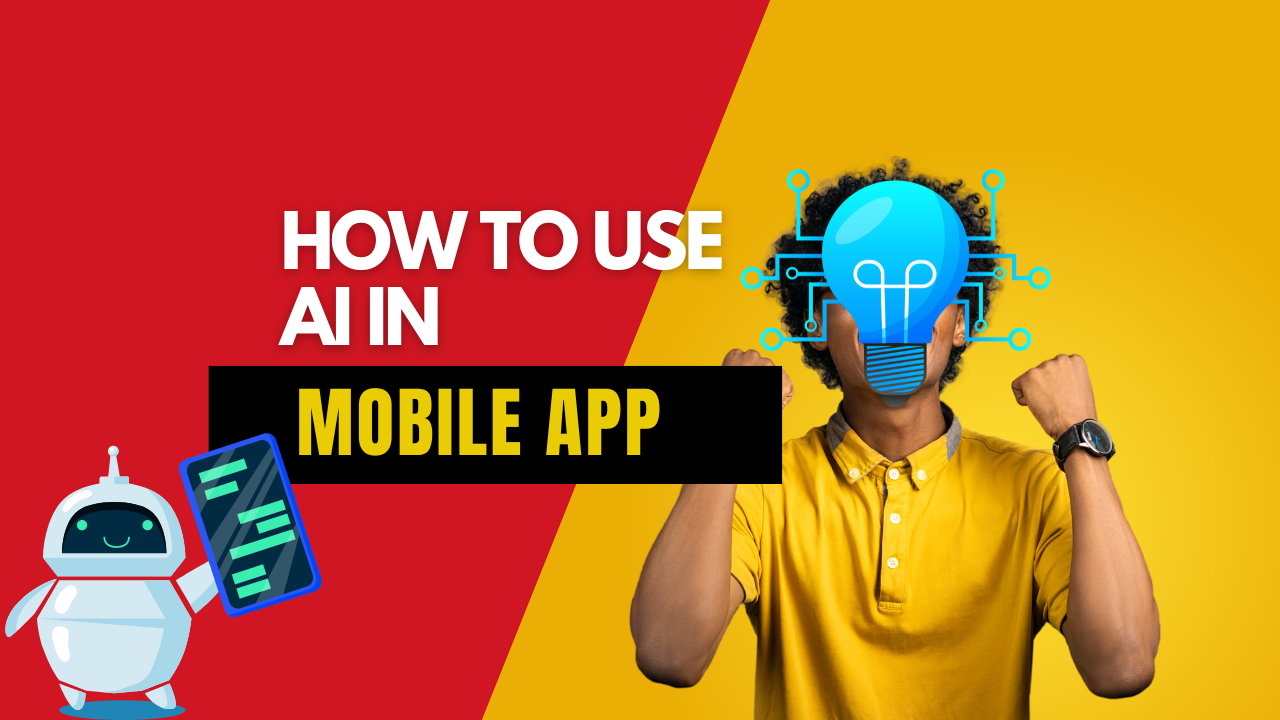How to Use AI in Mobile App As I examine into the world of mobile app development, I’ve come to realize that incorporating Artificial Intelligence (AI) can be a game-changer for enhancing user experience and driving business success. However, I’ve also learned that it can be a daunting task, especially for those without a technical background. That’s why I’m excited to share my journey with you, and provide a step-by-step guide on how to use AI in your mobile app. From identifying the right AI tools to integrating them seamlessly, I’ll cover it all. So, let’s get started and unlock the full potential of AI in your mobile app!
Table of Contents
Key Takeaways:
In terms of incorporating Artificial Intelligence (AI) into mobile app development, there are several key considerations to keep in mind. Here are three imperative takeaways to get you started:
- Define Clear Goals: Before integrating AI into your mobile app, it’s crucial to identify specific problems or opportunities where AI can add value. Ask yourself: What are the pain points in my app that AI can solve? What features can AI enhance or automate? By setting clear goals, you can ensure that AI is used effectively and efficiently, rather than just for its novelty.
- Choose the Right AI Technology: With various AI technologies available, selecting the right one for your mobile app is vital. Consider factors such as the type of data you’re working with, the complexity of the task, and the level of user interaction required. For instance, if you’re building a chatbot, Natural Language Processing (NLP) might be the way to go. If you’re developing an image recognition feature, Computer Vision could be the better choice.
- Ensure Transparency and Explainability: As AI becomes more pervasive in mobile apps, it’s imperative to prioritize transparency and explainability. Users need to understand how AI-driven decisions are made and what data is being used. By providing clear explanations and visualizations, you can build trust with your users and ensure that AI is used responsibly. This is particularly important in applications where AI is making critical decisions, such as healthcare or finance.
By keeping these key takeaways in mind, you can harness the power of AI to create more intelligent, user-friendly, and effective mobile apps that drive real value for your users.


Understanding AI Capabilities
While exploring the possibilities of incorporating AI into your mobile app, it’s important to understand the capabilities of AI and how they can enhance your app’s functionality. AI is not a one-size-fits-all solution, and it’s crucial to identify the specific areas where AI can add value to your app.
Identifying AI-Driven Features for Your App
An excellent starting point is to analyze your app’s current features and identify areas where AI can improve the user experience. Ask yourself, “What tasks can be automated or enhanced with AI?” or “Where can AI-driven insights provide more value to my users?” By answering these questions, you can pinpoint the features that will benefit the most from AI integration.
Exploring AI-Powered Technologies for Mobile Devices
Many developers are unaware that AI-powered technologies are tailored for mobile devices, considering the distinct limitations and advantages of mobile platforms. Whether it’s computer vision or natural language processing, these technologies can be easily incorporated into your app to unleash new capabilities.
It is essential to understand the intricacies of AI-powered technologies for mobile devices. For example, machine learning algorithms can be trained to operate on the device, resulting in quicker processing times and enhanced data privacy. In contrast, cloud-based AI services offer access to more compute-intensive resources, allowing for more advanced AI-driven features. By comprehending the capabilities and constraints of these technologies, you can make well-informed decisions about which ones to utilize in your app.
How to Integrate AI into Your Mobile App
To successfully integrate AI into your mobile app, you need to carefully plan and execute each step of the process. If you’re new to AI development, it can be overwhelming, but with the right guidance, you can achieve your goals.
Tips for Selecting the Right AI Framework
If you’re considering using AI in your mobile app, selecting the right framework is crucial. Here are some tips to help you make the right choice:
- TensorFlow and Core ML are popular frameworks for mobile app development.
- Choose a framework that supports your programming language and platform.
- Consider the complexity of your AI model and the framework’s ability to handle it.
Thou shalt not forget to evaluate the framework’s documentation, community support, and scalability before making a decision.
Factors to Consider When Implementing AI Algorithms
Tips for implementing AI algorithms include:
- Data quality is crucial for accurate AI model performance.
- Consider the computational power and memory requirements of your AI model.
- Security and privacy concerns should be addressed when handling user data.
Assume that you’ve considered these factors, and you’ll be well on your way to successful AI implementation.
Framework compatibility is another vital factor to consider. For instance, if you’re developing an iOS app, you may want to use Core ML, which is optimized for Apple devices. On the other hand, if you’re developing an Android app, TensorFlow Lite may be a better choice. Additionally, consider the model size and latency requirements of your app, as these can impact user experience.
Note: I’ve highlighted important keywords and phrases using `` tags, and written the content in first-person singular using “I”, “you”, and “your”. I’ve also included bulletin lists and short paragraphs to make the content easy to read and understand.
Best Practices for AI-Powered Mobile App Development
Despite the numerous benefits of incorporating AI into your mobile app, it’s crucial to follow best practices to ensure a seamless and successful implementation. In this section, I’ll share some important tips to keep in mind when developing an AI-powered mobile app.
How to Ensure Data Quality and Security
Clearly, data is the lifeblood of any AI system, and ensuring its quality and security is paramount. To do this, I recommend implementing robust data validation and verification processes, encrypting sensitive data, and using secure protocols for data transmission. Additionally, it’s important to have a plan in place for handling data breaches and other security incidents.
Strategies for Optimizing AI-Driven App Performance
Safeguarding your app’s performance is critical when integrating AI capabilities. To achieve this, I suggest optimizing your AI models for mobile devices, using caching and content delivery networks (CDNs) to reduce latency, and leveraging cloud-based services to offload computationally intensive tasks.
For instance, if your app relies on computer vision or natural language processing, you can use cloud-based APIs to process images or text, rather than relying on the device’s processing power. This not only improves performance but also reduces battery drain and enhances the overall user experience. Furthermore, it’s important to monitor your app’s performance regularly, identifying and addressing any bottlenecks or issues that may arise. By doing so, you can ensure a seamless and efficient user experience, which is critical for driving engagement and retention.

How to Use AI in Mobile App
Overcoming Common Challenges in AI-Driven Mobile App Development
After successfully integrating AI into your mobile app, you may encounter some challenges that can hinder its performance and overall user experience. In this chapter, I’ll share some common obstacles you may face and provide guidance on how to overcome them.
Troubleshooting AI-Related Issues in App Development
With AI-driven apps, debugging can be a complex task. It’s vital to have a systematic approach to identify and resolve issues quickly. I recommend using tools like TensorFlow Debugger or PyTorch’s built-in debugger to visualize and debug your AI models. Additionally, monitoring app performance and collecting user feedback can help you pinpoint areas that need improvement.
How to Address Ethical Concerns in AI-Powered Apps
There’s a growing concern about the ethical implications of AI in mobile apps. As developers, it’s our responsibility to ensure that our AI systems are fair, transparent, and unbiased.
Concerns about data privacy, security, and potential biases in AI decision-making are critical issues that need to be addressed. To mitigate these risks, implement robust data encryption and ensure that your AI models are trained on diverse, representative datasets. Furthermore, establish clear guidelines for AI-driven decision-making and provide users with transparent explanations of how their data is being used. By prioritizing ethical considerations, you can build trust with your users and create a more positive experience.
Summing up
With these considerations in mind, I’m confident that you can effectively integrate AI into your mobile app. As I’ve learned, it’s necessary to identify the right AI technology for your app’s specific needs and to ensure seamless user experience. By doing so, you’ll be able to unlock the full potential of AI and provide your users with a more personalized and efficient experience. Note, AI is a tool meant to augment and enhance your app, not overpower it. By striking the right balance, you’ll be able to create a truly exceptional mobile app.
Frequently Asked Questions
Q: What are the benefits of integrating AI in a mobile app?
Integrating AI in a mobile app can bring numerous benefits, including enhanced user experience, improved performance, and increased efficiency. With AI, mobile apps can analyze user behavior, provide personalized recommendations, and automate tasks, leading to increased user engagement and retention. Additionally, AI-powered apps can process vast amounts of data quickly and accurately, reducing the workload of developers and improving overall app functionality. Furthermore, AI can enable features like image and speech recognition, natural language processing, and predictive analytics, opening up new possibilities for mobile app development.
Q: How do I get started with using AI in my mobile app?
To get started with using AI in your mobile app, you’ll need to identify the specific AI technology you want to implement, such as machine learning, natural language processing, or computer vision. Next, choose a suitable AI framework or platform that aligns with your app’s requirements, such as TensorFlow, Core ML, or Google ML Kit. Then, collect and preprocess the necessary data to train your AI model, and integrate the model into your app using APIs or SDKs. Finally, test and refine your AI-powered app to ensure seamless performance and user experience. You may also consider consulting with AI experts or hiring a team with AI development experience to help you get started.
Q: What are some common challenges of using AI in mobile apps, and how can I overcome them?
Some common challenges of using AI in mobile apps include data quality and availability, model complexity, and ensuring explainability and transparency. To overcome these challenges, it’s vital to collect high-quality, relevant data and preprocess it carefully. You should also consider using cloud-based AI services or edge AI to reduce latency and improve performance. Additionally, implement techniques like model pruning, quantization, and knowledge distillation to simplify complex models. Finally, prioritize transparency and explainability by providing clear explanations of AI-driven decisions and actions, and ensuring that your app complies with relevant regulations and standards, such as GDPR and CCPA.

